33 Awesome Things to Do in Nairobi, Kenya
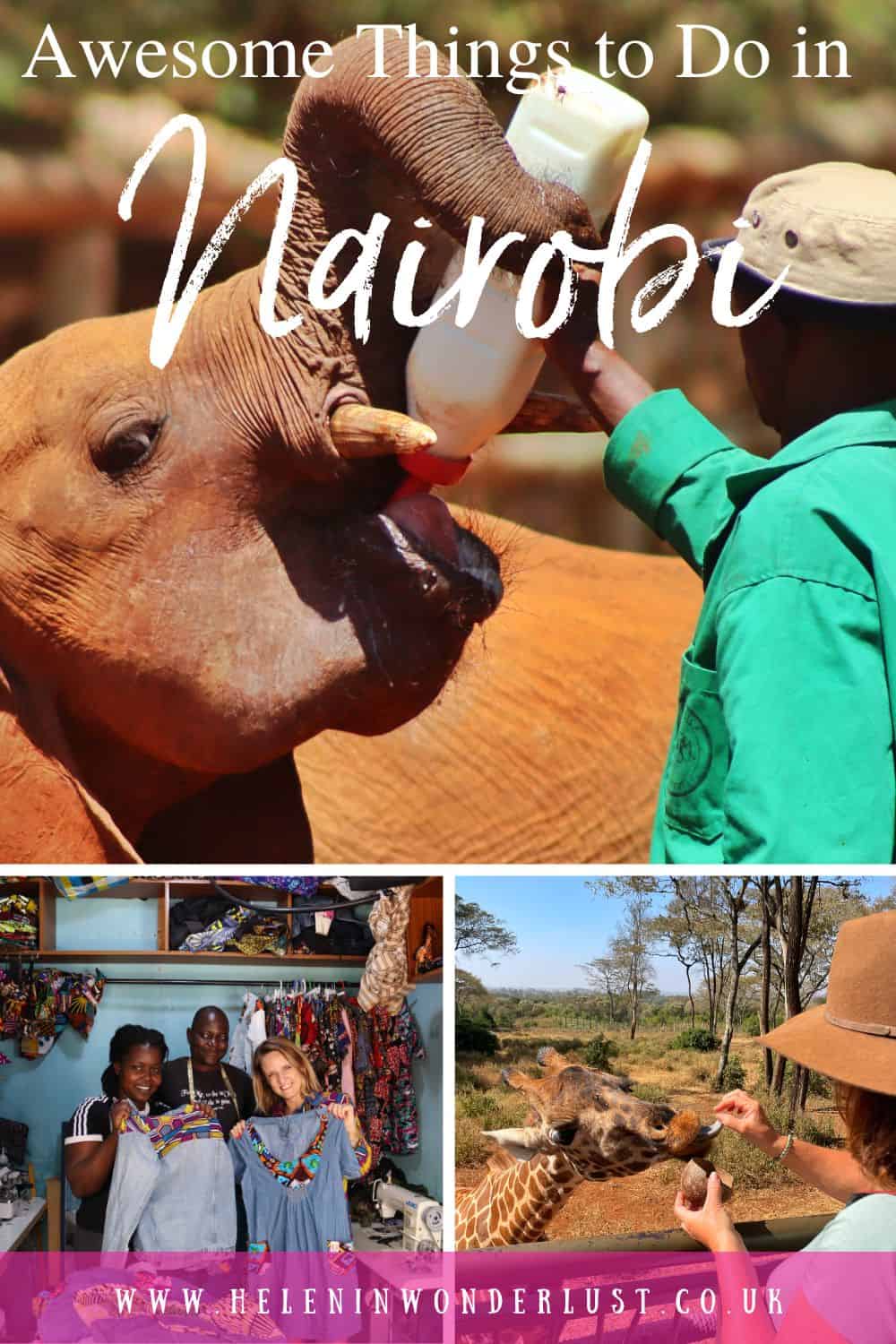
The first time I visited Nairobi, I didn’t like it much.
I’d spent the previous months in Livingstone, Zambia, then in the relatively quiet town of Bagamoyo in Tanzania, then climbing Kilimanjaro. So when I arrived in Nairobi, I felt that it was too hectic, big and intimidating.
But now, I love Nairobi and I think Kenya is one of the best countries to visit in Africa, especially for your first trip to the continent. Nairobi feels like a second home to me. Isn’t it funny how things change?
I still hate the traffic, but once you spend a bit of time in the city, you’ll realise just how cool it is and how many great things there are to do in Nairobi. Kenya’s capital is an exciting city, with lots of art and culture, fantastic social initiatives and a great nightlife scene.
Plus it has a national park on its doorstep, how many other cities can claim that? So with this list, I aim to give you some ideas for the best things to do in Nairobi!
PS. Did you know that I organise Kenya & Tanzania group trips? Click here for details!
Please Note: Some of the links in this post are affiliate links, which will earn me a small commission at no extra cost to you. Affiliate sales help with the running costs of this site, so thank you for your support!
Awesome Things to Do in Nairobi, Kenya
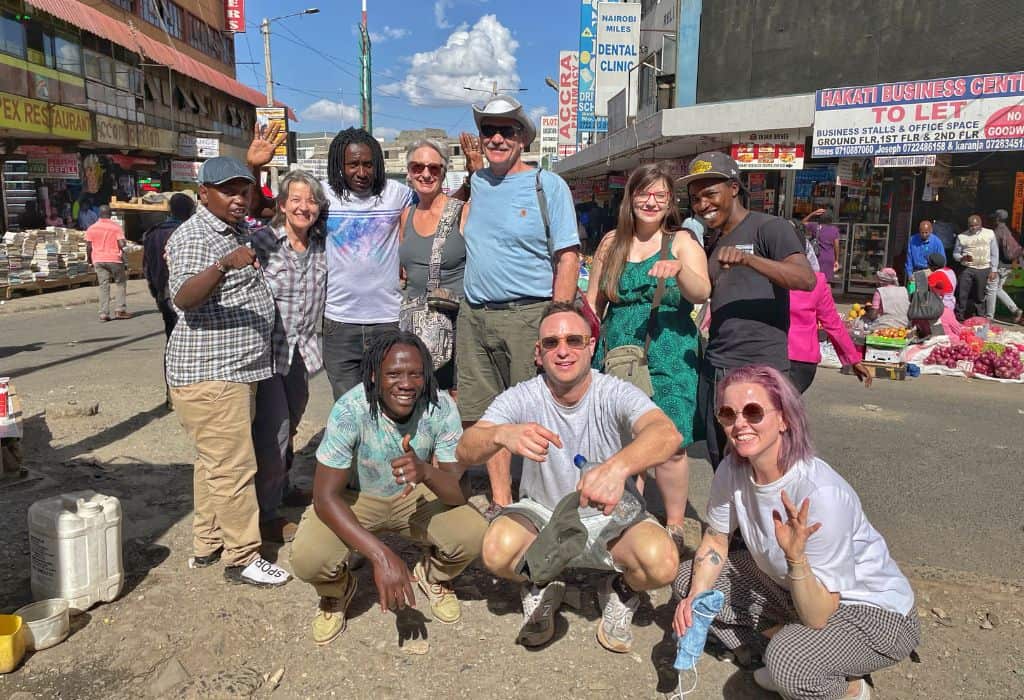
1. Go On a City Centre Tour with the Nai Nami Guys
One of my favourite things to do in Nairobi is to go on a city tour with Nai Nami – Mrembe, Donga, Cheddaz, Kissmart, Ndee, Mwas and QwiQwi.
They’re all former street boys, each with their own interesting story to tell about their lives on the streets of Nairobi. This is different from a normal Nairobi city tour for the fact that the tour is more about them individually, rather than the history of the city.
They walk you through the streets of downtown Nairobi, down streets where tourists probably wouldn’t (or shouldn’t) go alone, due to it being a notoriously dangerous part of the city. But these are their streets and you always feel like they have you in their care.
As you walk, they’ll tell you their stories which are truly inspiring. In their words “This encounter is a unique opportunity to get inspired by people from a different world”.
MY TIP: Wear comfy shoes, you’ll do a lot of walking. And don’t take your big cameras as you’re not allowed to use them in the city centre.
2. Take Part in a Kenyan Cooking Class
Learning to make local Kenyan and East Africa food is a great way to make local friends and learn about Kenyan culture.
There are several cooking classes on offer in the city and many of those include a visit to the local market where you will do some shopping, visit a local’s home and see what everyday life in Kenya is like.
3. Take a Historical Nairobi City Tour
You may also want to take a more historical/political tour of the city itself, through the CBD and to some of the important historical landmarks in the city, like the parliament buildings, the Sarova Stanley, KICC and Uhuru Park.
MY TIP: Be careful about taking photographs – even on your phone. You are not allowed to take pictures of government buildings or in the CBD and the police have started fining people who do.
4. Stop for a Coffee at the Thorn Tree Cafe (of Lonely Planet fame)
At the bottom of the Savova Stanley Hotel, you will find the original Thorn Tree Cafe, which inspired the name for Lonely’s Planet’s Thorn Tree Forum. In the middle of the cafe, there is a huge acacia tree where travellers can pin notices for each other – pretty romantic, hey?
Hence why the name inspired the Lonely planet online forum. Grab yourselves a cup of tea and a slice of cake and whilst you are there, you can also take a little tour of this historic hotel which has hosted politicians, movie stars and visiting royals (including the Queen) since opening in 1902.
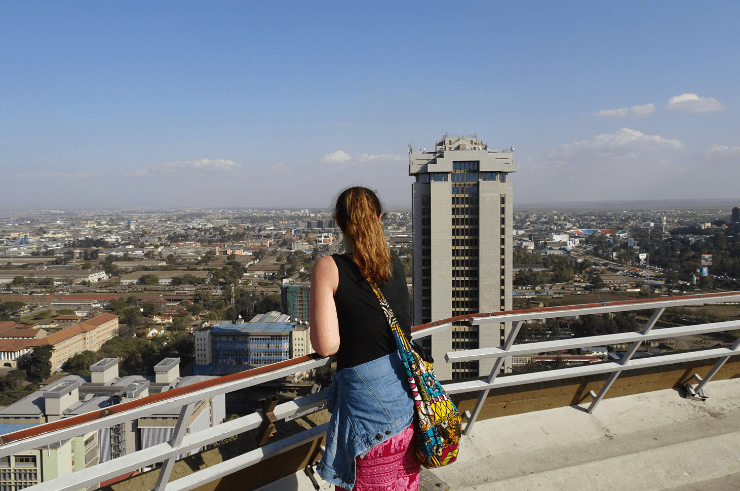
5. Take in the Views from the Top of the Kenyatta International Convention Centre
The Kenyatta International Convention Centre (KICC) is the 6th tallest building in Kenya, located in the CBD. For a small fee, you can take a lift up to the top of the tower for one of the best viewpoints in the city. It’s a popular spot for tourists, as well as couples on dates as it’s also a nice place to watch the sunset in the city.
6. Picnic in Nairobi’s Uhuru Park
Uhuru Park lies right in the centre of town and is a popular hangout spot for Nairobians, especially on the weekends. Uhuru means ‘freedom’ in Swahili. I especially like it here on Sundays, when there are lots of families about, ice cream vans and fairground rides, creating a nice and vibrant atmosphere. Take a picnic to get the most out of the experience.
MY TIP: Avoid Uhuru Park after dark or during any kind of political rallies when it is not safe to visit and stick to public areas.
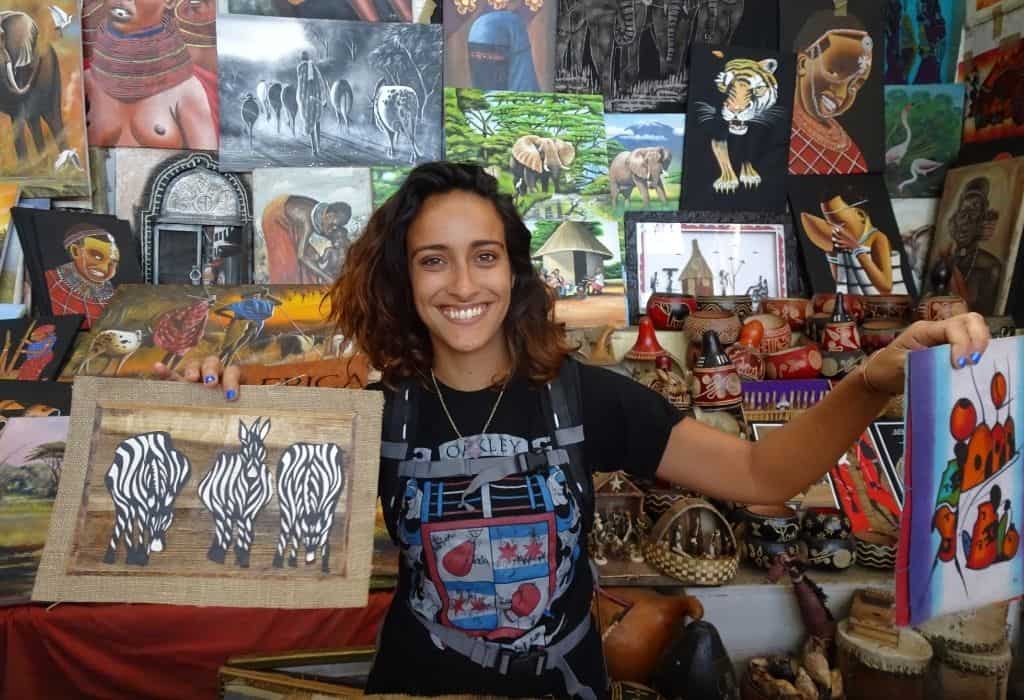
7. Shop ‘Til You Drop at the Village Market
Nairobi has no shortage of malls and one of the best is the pretty Village Market in Gigiri. You can literally buy anything you need here, from designer clothes to Kenyan souvenirs and there are tons of restaurants and cafes for when you get tired of shopping.
My Tip: The other malls I tend to go to are The Hub in Karen and Galleria in Langata. Good places to go to the supermarket, pharmacy, ATM and pick up SIM cards.
8. Get Away From It All in Karura Forest
Near the CBD lies Karura Forest, a great place to get away from the hustle and bustle of Nairobi. There are plenty of things to do there, whether you just want to take in the serene environment or do something more active like walking, mountain biking or horse riding.
Visitors can get involved with tree planting and there’s also a pretty waterfall you can go and see. There are a few picnic sites so you could take one with you to make the most of your visit (just watch out for the monkeys) or eat at one of my recommended restaurants nearby such as Amaica or About Thyme.
9. Go Cheese Tasting at Brown’s Cheese Co.
Did I have you at cheese? To me, there are few things that sound better than going cheese tasting at Brown’s Food Co.
An afternoon at the farm including a cheese tasting, factory tour, and 3-course lunch (with 2 glasses of wine or beer) costs 4,500 KES (around $35). For kids, it’s 1,000 KES for over 5’s and 2,000 KES for over 12’s which includes pizza and ice cream, as well as lunch.
You can also try milking a cow too! If you don’t want to make the journey out to the farm, you can also order cheese platters! Book ahead!
10. Go Shopping at Spinner’s Web
Spinner’s Web is known as Kenya’s biggest arts and craft shop where you can all sorts of beautiful, locally made things, including handicrafts, pottery, home decor, jewelry, furniture, lighting, and accessories.
The showroom is currently open 9.30am – 6pm (but you can check here to be sure).
11. Take a Tour of a Coffee Estate
Kenya is one of the world’s leading coffee producers, so when you’re in the area, why not visit a coffee farm?
There are a couple of different coffee estates near Nairobi – the Fairview Coffee Estate and Karunguru Coffee Estate, both of which are Kenyan-owned, with Fairview around 30 minutes from the city centre, and Karunguru around 45 minutes away.
You can do tours at both estates to learn about the coffee-making process and enjoy some delicious coffee!
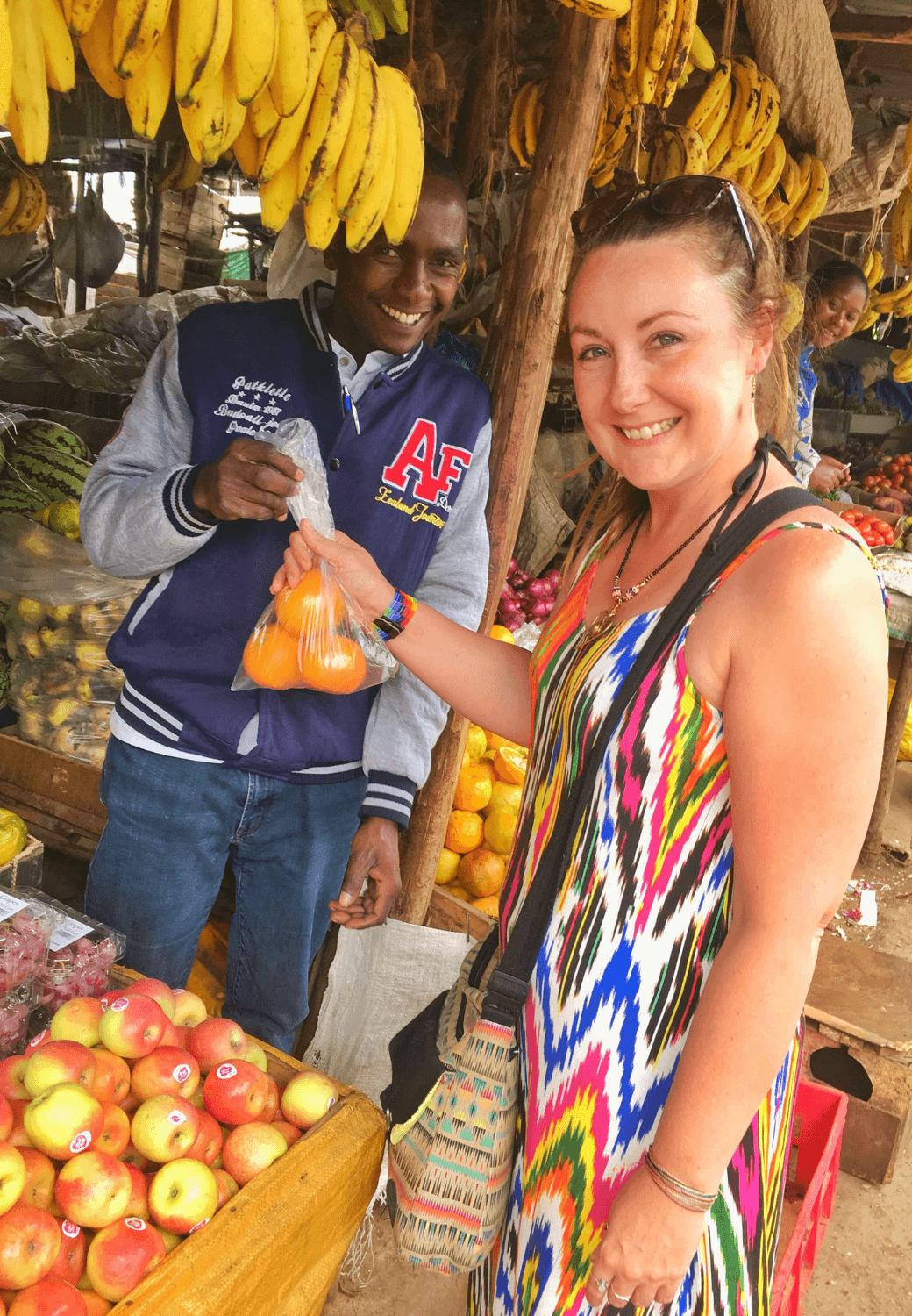
12. Buy Your Fruit n’ Veg at City Park Hawkers
Up near Westlands and Parklands, you’ll find City Park Market (or City Park Hawkers). There’s nothing majorly special about this market, lots of fruit and veg etc, but it is a great place to just get a feel for everyday life in Nairobi.
Around the back of the stalls, there are some small local restaurants serving nyama choma (roasted meat) with ugali (maize porridge, the staple food of Kenya) and kachumbari (onion/tomato salad/chilli salad).
MY TIP: Please ask before taking any photos of the stalls.
13. Learn About the History of Kenya at the National Museum
Visit Nairobi’s National Museum where you can learn about Kenya’s rich heritage including culture, nature, history and art.
As well as the museum, here you will find the Nairobi Snake Park, art galleries, shops, botanical gardens, and a nature trail.
14. Shop for Beautiful Souvenirs at Wasp & Sprout
Wasp & Sprout is an amazing fair-trade initiative selling all kinds of wonderful things, like furniture, homeware, crafts, and beautiful African fabric cushions!
My particular favourites are the items by Kangarui. I’m obsessed with their artwork! They also have a lovely cafe selling breakfast, brunch, sandwiches, and salads, as well as some nice cocktails, coffees, soft drinks, and desserts.
15. Visit a Tea Farm
Kenyans love their tea and Kenya is also one of the biggest tea-producing nations in the world.
One of the best tea farms near Nairobi, is the Kiambethu Farm near Limuru town. Arriving at 11am, you’ll be offered a cup of tea (or coffee) and learn about the tea-making process and history of the farm, before taking a walk through the indigenous forest where you may see Colobus monkeys.
Afterward, you’ll have a 3-course buffet lunch prepared with food from the garden, whilst enjoying the incredible views. The cost is 4,200 KES per person, and children under 12 are half price.
Also nearby is the Kawamwaki Farm, where you can go horse riding!
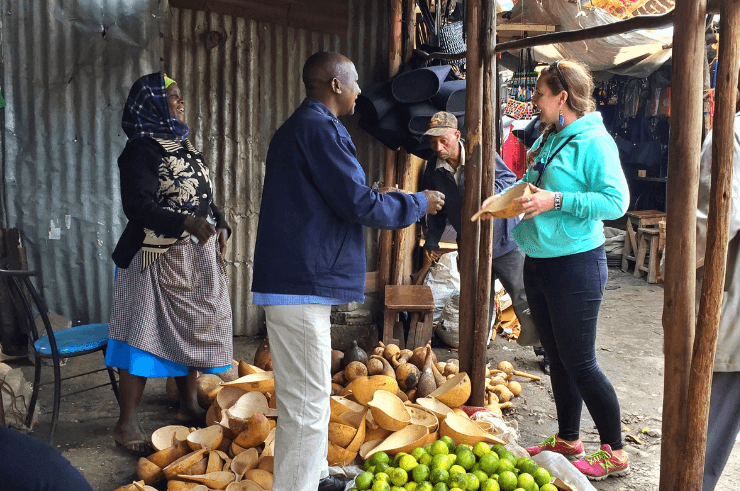
16. Take a Kibera Township Tour
People are often torn about going on Kibera slum tours, which is one of the reasons I don’t include them in my Kenya group tours.
I think it’s a personal choice but I lean towards the pro side – if done with respect for the local people and the right organisation. I think Kibera tours can be good, as they are usually set up by people who have lived in Kibera their whole lives, providing employment and income for some of the residents.
Plus they can show the positive sides of Kibera. Many tourists to Kenya won’t have been exposed to places like Kibera before, but going on a tour will likely change your opinions of people who live in slums/townships – which I think is a good thing.
These tours can also highlight issues to people who could potentially help create change. And if you buy from shops when you’re in Kibera, you’re supporting local businesses too.
On the other hand, these tours won’t benefit everyone and if not done with respect and care, they can leave some residents feeling angry, degraded, and exploited.
If you go, listen, observe, and interact, but don’t be an insensitive camera-wielding asshole.
Whether you take a tour is up to you, but if you do, research the company/guide you go with and remember that a lot of the responsibility lies on you. Don’t always believe the reviews.
My friends went on a tour that had great reviews on Airbnb, but the guy basically pressured them into buying things, lied about where he lived, and lied about his sick wife staying with her aunt after complications from a c-section.
He had shown them a picture of the wife and they later spotted his wife and the baby and his real house on the tour (it was next door to his ‘pretend’ house). She tried to hide but it was too late. They left feeling a bit weird about the whole thing.
For more reading on the ethics of slum/township tourism in Kenya, click here, here and here and then make your own mind up.
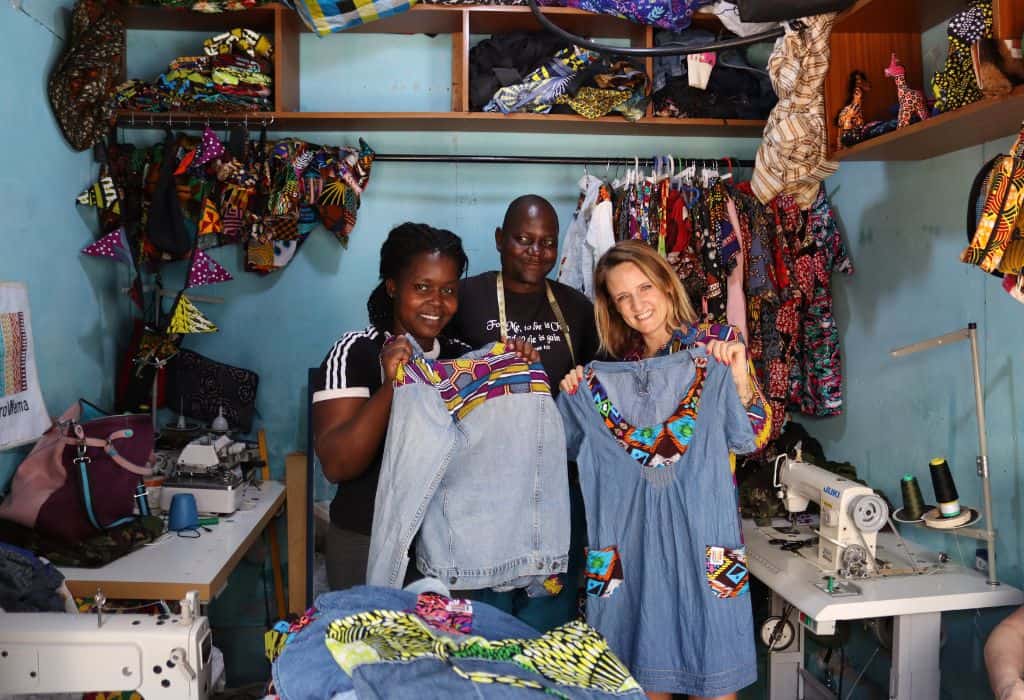
17. Buy Beautiful Upcycled Clothes by AfroWema
Whilst you’re around Kibera, I would highly recommend you visit AfroWema. They work with local artisans to make beautiful jewellery and upcycle clothing! Their motto is ‘Save the Planet with Style’.
I am in love with their incredible denim jackets! They don’t have a physical shop yet, but you can get in touch with them via Facebook or Instagram. Most of their artisans work in and around Toi Market, the largest second-hand clothing market in Kenya (you can find some great bargains there too). The ultimate thrift shop.
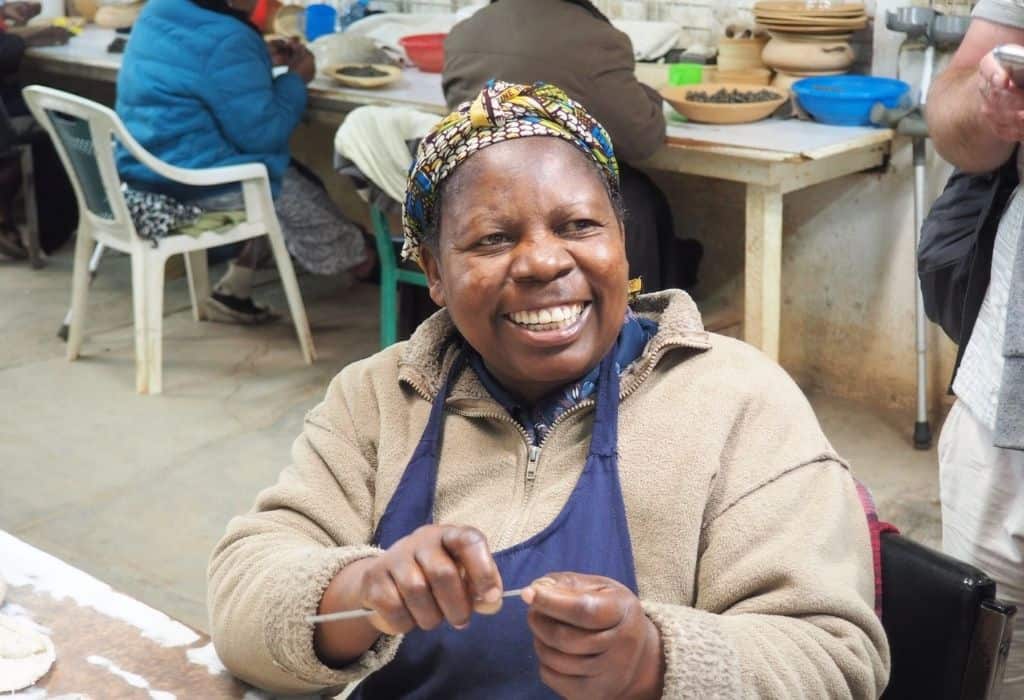
18. Support a Social Enterprise at Kazuri Beads
Kazuri Beads is a social enterprise, employing mostly women from disadvantaged backgrounds. They mostly make jewellery and pottery and sell them to tourists and when you visit you can take a tour of the factory and meet the women who work there.
19. Stay at the Luxurious Giraffe Manor
The ultimate ‘things to do in Nairobi’ bucket list item surely has to be a stay at the luxurious Giraffe Manor. The hotel is home to a number of endangered Rothschild’s giraffes who wander freely around the grounds.
Guests can interact with the giraffes over breakfast and afternoon tea as well as any other time they feel like a visit! My friend Brenna wrote an awesome and honest post about her stay at Giraffe Manor if you want to know what it’s really like and, most importantly if it’s worth the cost.
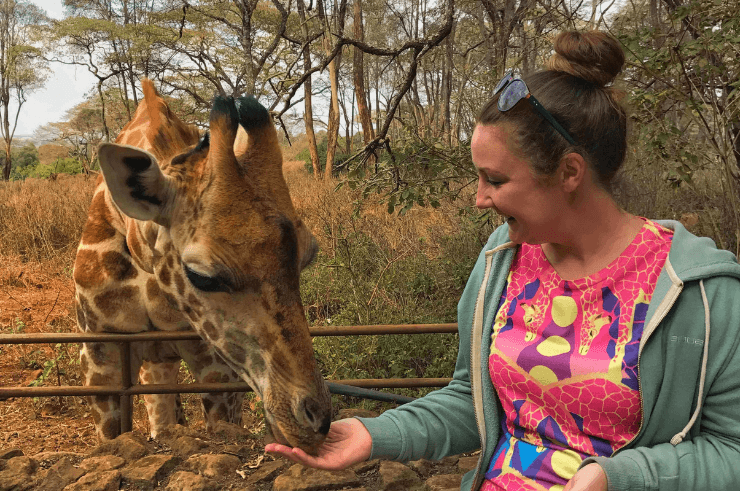
20. Feed a Giraffe at the Nairobi Giraffe Centre
If your budget doesn’t stretch to a stay at Giraffe Manor, do not worry! One of the best places to visit in Nairobi is the Nairobi Giraffe Centre, which is just next door to Giraffe Manor and is part of the same sanctuary.
Visitors can spend time with the giraffes and they also give really good, informative talks about the species too. You can stay as long as you like and it only costs $15… absolute bargain.
It’s open from 9am – 5pm daily and there’s no need to book in advance.
21. Visit a Farmers Market
Nairobi has some great farmer’s markets that you can visit!
On Saturdays, the KSPCA (Kenyan Society for the Protection & Care for Animals) holds a farmers market in Karen which is fun for all the family. There are stalls selling locally-made goods (jewellery, honey, jams, cakes etc) as well as bars, food stalls, and a kids play area and entertainer.
Whilst you’re there you can also see some of the cats and dogsd up for adoption.
There’s also The Organic Farmers Market which takes place from 9am – 4pm on Saturdays at 16 Marula Lane, Karen and then on Sundays at Kilimani Primary School. They have all sorts of cool things for sale such as food, essential oils, granola, spices, nut butter, and fresh produce.
22. Learn All About the ‘Out of Africa’ Writer at the Karen Blixen Museum
If you’ve ever read or watched ‘Out of Africa’ (as I did whilst writing this post) you’ll want to visit the Karen Blixen Museum. The museum at ‘the foot of the Ngong Hills’ is the former home of Danish writer and coffee farmer, Karen Blixen.
While here you can take tours of the museum, learn about Kenya’s colonial past, and get a cup of coffee or some food at the Karen Blixen Coffee Garden. I had a really good parmigiana here – it was really delicious! I’d go back just for that, but the museum was good too!
23. Go Hiking in the Ngong Hills
Going hiking in the Ngongo Hills is one of the most outdoorsy and active things to do in Nairobi. Situated a little way out of the city, near Ngong town, the Ngong Hills are a series of 7 hills with fantastic views of the surrounding area.
If you want to walk the whole way, it takes between 4 – 6 hours, depending on how fast you go. There’s also a nice picnic site at the top where you can relax after all that exercise.
Entry fees are very reasonable, at 696 KES (around $5) to enter. Just be aware that all payments are cashless, meaning you need to pay by card or Mpesa.
If you’re feeling extra adventurous, you can also go zip lining in the Ngong Hills with Kompass. they also have a restaurant, as well as other activities such as archery, zip lining, and paintballing.
MY TIP: You can’t bring plastic bottles on the hike, so make sure you have a reusable bottle.
24. Visit Langata Links Shops
A great place to visit on your trip to Nairobi is Langata Link Shops, which sells lots of different items from local producers.
This includes some of my favourite kenyan brands, Kangarui, Natural Lamu, Lulu Kitolo Studio, and Ocean Sole. Ocean Sole is a cool social enterprise that recycles old flip-flops that wash up on the beaches of Kenya and make them into cool objects – both art and more functional things!
This is also where you’ll find the Tin Roof Cafe Langata (there’s also one in Karen) which serves delicious food.
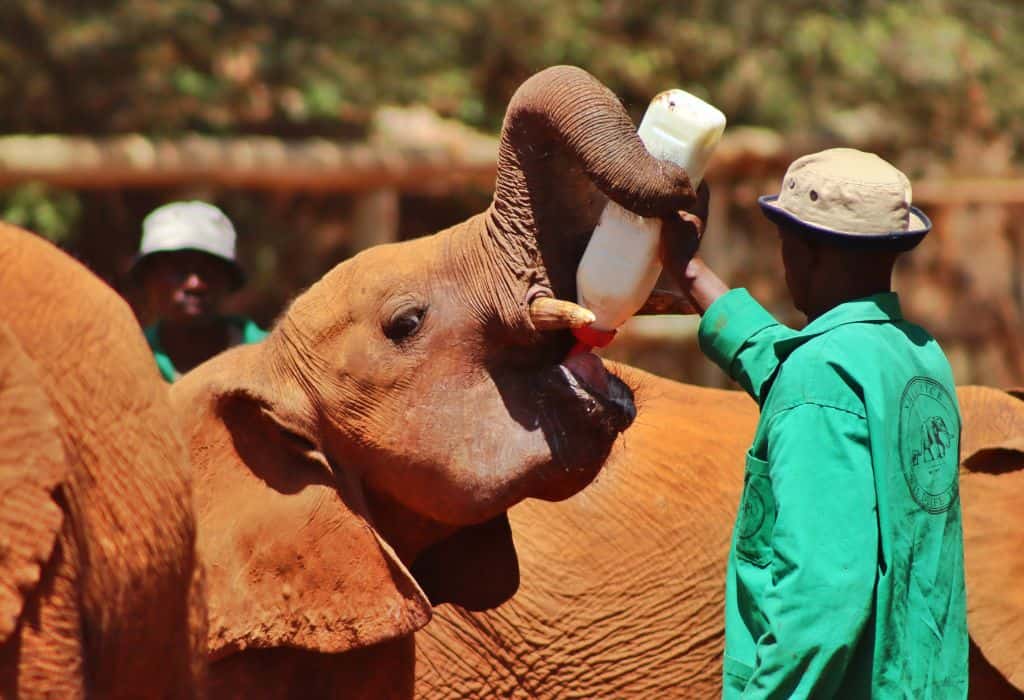
25. See the Baby Elephants at the Nairobi Elephant Orphanage
One of my favourite places to visit in Nairobi is the Sheldrick Wildlife Trust, (formerly the David Sheldrick Wildlife Trust) a rehabilitation centre for abandoned or orphaned baby elephants (and other animals, occasionally rhinos) who are too young to survive in the wild on their own.
The elephant orphanage in Nairobi was started by the late Dame Daphne Sheldrick in memory of her late husband, David, a legendary ranger of Tsavo National Park. The elephants are cared for and then released back into the wild when they are old enough.
Visitors are allowed in at 11 a.m. each day for approximately 1 hour to see the elephants and listen to a talk by one of the keepers. Sometimes the baby elephants come up to say hello and I’ve had my foot trodden on many times! You can adopt a baby elephant for as little as $50 a year.
You now have to book to visit. Bookings open 3 months in advance via the website and fill up quickly, so plan ahead. It costs $20to visit plus the Nairobi National Park fees ($43), so you may as well combine with a Nairobi National Park safari.
26. Buy Beautiful Souvenirs at Utamaduni – Artisans of Africa
Located in Langata, Utamaduni has an amazing array of African crafts.
They sell all kinds of things from African-inspired fashion and jewellery, to homeware and fabrics. Including my favourite Kangarui cushions! There’s also a restaurant & garden where you can take a well-earned rest from all that shopping.
27. Visit Bomas of Kenya to Learn About Kenyan Culture
If you’re looking for one of the best places in Nairobi to learn about Kenyan culture and history, take a visit to Bomas of Kenya. The centre was set up to educate people about the different ethnic groups found in Kenya and to help preserve and celebrate the Kenyan culture.
Visitors can watch music and dance performances and see the many exhibits. There are a number of tours that visit Bomas of Kenya, along with the Giraffe Centre, Elephant Orphanage and sometimes Nairobi National Park.
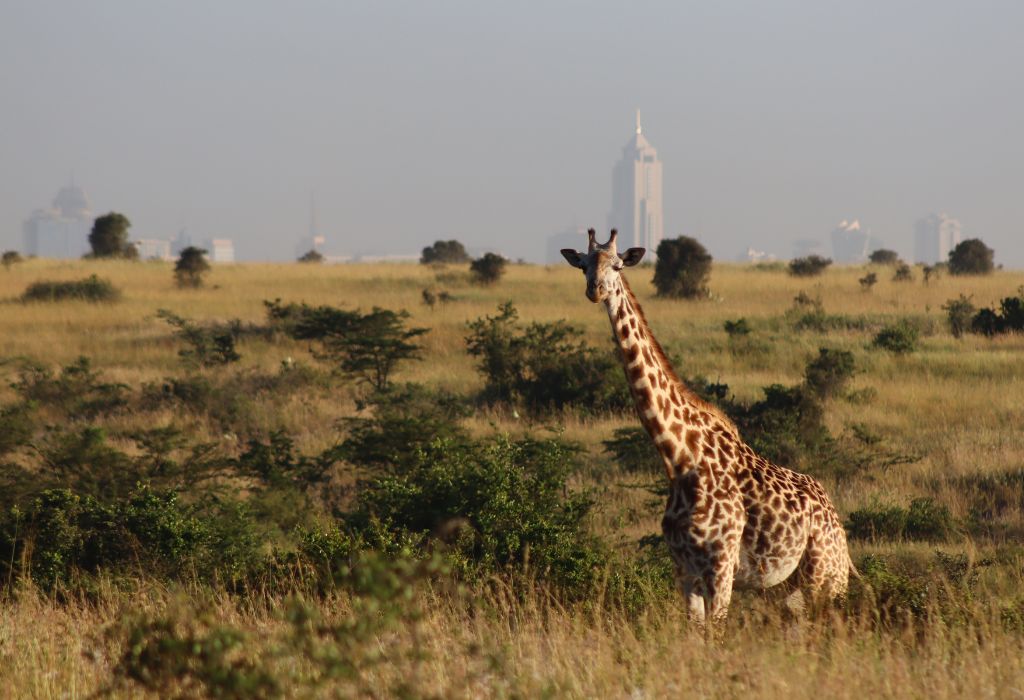
28. Go on Safari in Nairobi National Park
Just outside the city, lies Nairobi National Park, one of the coolest things to do in Nairobi and one of the best places in Kenya to see the endangered black rhino, plus a ton of other animals including lions and giraffes. Plus, you get the Nairobi skyline as a backdrop!
If you’re in Nairobi for a short time (e. for work) this is an awesome way to go on safari without having to travel too far. Plus, you get the city of Nairobi as a backdrop. All you need is a day! Sometimes you’ll even see animals as you leave Jomo Kenyatta International Airport.
You can book your Nairobi National Park tour in advance here or you can often book through your accommodation when you arrive.
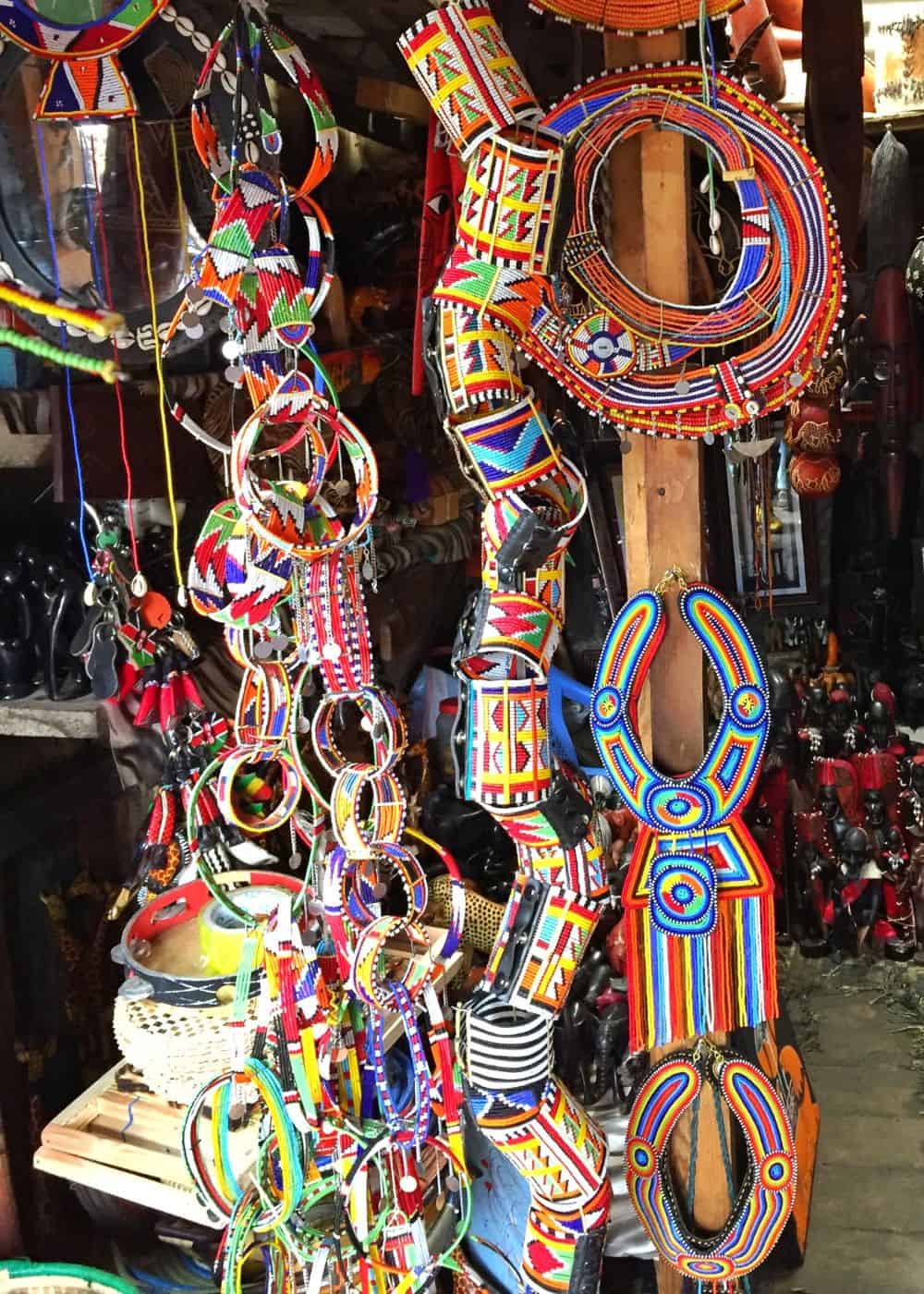
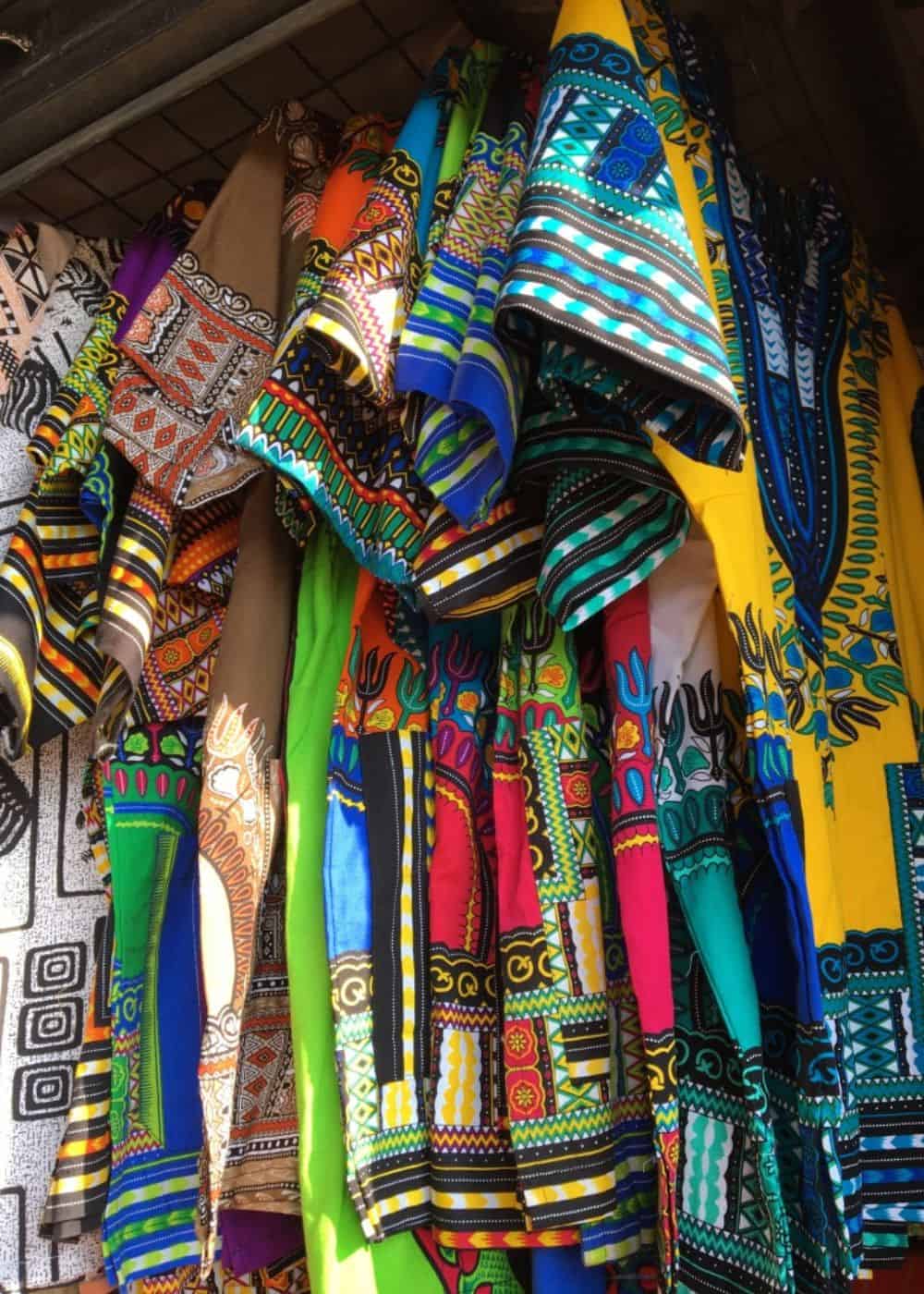
29. Barter Hard at the Maasai Markets
One of my favourite things to do is go to the colourful Maasai markets to pick up some souvenirs including jewellery, wood carvings and clothing. Each day the Maasai Market takes place in a different spot around the city between 8 am – 6pm.
- Monday: No market.
- Tuesday: Prestige Plaza on Ngong Road.
- Wednesday: Capital Centre on Mombasa Road.
- Thursday: Junction Mall on Ngong Road.
- Friday: Village Market in Gigiri.
- Saturday: High Court car park in the city centre.
- Sunday: Yaya Centre in Hurlingham.
If you go, just be aware that there are lots of touts around who will offer to ‘help’ you, but really they’re in cahoots with the stall owners and just out to get as much money from you as they can – I once caught up with one of my tour group as they were about to be charged $500 for some wooden bowls and a few bracelets.
So whilst I think it’s important not to go too low, people need to make a living, it’s ok to bargain and it is expected. I usually start at about half what they say, and then meet in the middle.
Try not to appear too interested and keep the conversion rates in your head. The stallholders will never let something go for less than it’s worth. I usually think I’ve gotten a great bargain, but when I tell my Kenyan friends what I’ve paid, they usually tell me I paid too much.
My favourite Maasai Market, though not part of the main Maasai Markets, is the one at the Galleria Mall. It’s on every day and is much, much calmer and you can generally browse in peace, although you will hear a lot of ‘Come into my shop, looking is free.’
Don’t get me wrong, you may still get ripped off if you’re not careful but, it’s a lot less hassle.
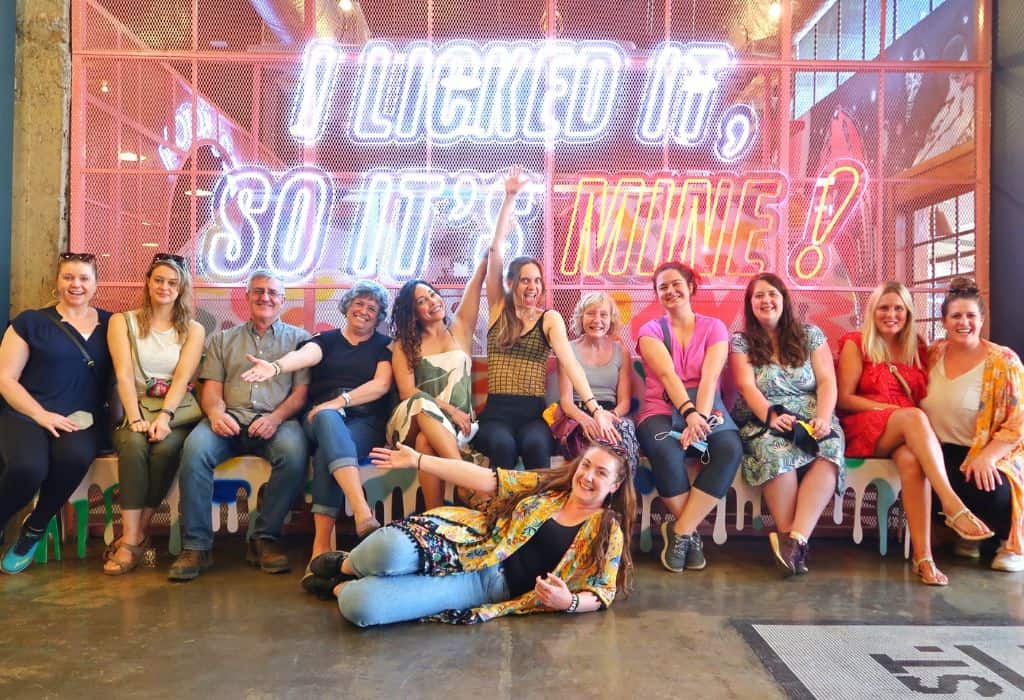
30. Dine at One of the Many Restaurants in Nairobi
There are plenty of great restaurants in Nairobi where you can find all sorts of amazing cuisine from all around the world.
Some of my favourite restaurants include:
- Boho Eatery: One of my favourite restaurants in Nairobi, this is a wholefoods restaurant focused on conscious and sustainable living. Near to the Giraffe Centre and Sheldrick Elephant Orphanage.
- Cultiva Farm: My other Nairobi favourite, this is a lovely high-end, farm-to-table restaurant in Karen. I pretty much always get the baked camembert and a Bloody Mary!
- About Thyme: A popular modern, yet cosy restaurant with a nice outside seating area. Their dishes are a mix of Mediterranean and Asian mostly with a few bbq/steak dishes thrown in too.
- Carnivore: Nairobi’s most famous restaurant and dining experience, serving unlimited amounts of Kenya’s most famous dish, nyama choma (bbq’d meat) – that’s where we are in the picture above. Choose from beef, turkey, chicken, rabbit, pork and ostrich. They also make a great ‘Dawa’ (medicine) cocktail. Always busy, so book ahead, especially if you are a large party. There’s also a nightclub.
- Talisman: Often named as the best restaurant in Nairobi with a varied and interesting menu, outside the city centre in Karen. This is a really lovely place for a treat!
- Karen Blixen Coffee Garden: Great place to stop for a coffee and some lunch whilst on a day trip in Karen.
- Urban Eatery: Modern foodie paradise, with four different kitchens: Indian, Mediterranean/Mexican/World, Asian/Sushi/Noodle Bar and Cafe/Bistro, as well as a frozen yoghurt counter and a bar. They also do takeaway.
- Java House: Popular chain cafe (basically the Kenyan Starbucks), there are a few throughout the city. Good locally made coffee and their chocolate cake is lovely!
- Artcaffe: Similar to Java House, there are a few throughout the city. I’m slightly obsessed with their Home Fries and smoothies.
- Wasp & Sprout: A fairtrade centre where you can shop and refresh! Their cafe sells breakfast, brunch, sandwiches and salads, as well as some nice cocktails, coffees, soft drinks and desserts.
- Nairobi Street Kitchen (NSK): One of the coolest spots in Nairobi and very Instagrammable (see above)! You can taste some of the amazing street food at the food market or hang out at the cool rooftop bar.
- Unseen Nairobi: Nice rooftop bar with food and good cocktails.
- Tin Roof Cafe: Nice cafe, two locations – one near to The Hub mall in Karen, the other at Langata Link Shops.
- Fifteen Rooftop: A great bar and restaurant with views overlooking Nairobi National Park on one side and the city on the other.
- Haandi: Nairobi’s most well-known Indian restaurant, always tasty food.
- Diamond Plaza: The Indian hub of Nairobi where you’ll find great Indian food as well as lots of Indian spices, clothes, movies and it’s also the home of the Africa Yoga Project.
- Amaica: Near to Karura, serves lots of traditional Kenyan food.
- The Alchemist: This is a bar/event space with several eateries inside including Mama Rocks.
- Nyama Choma Restaurants: These are cheap and cheerful bbq meat restaurants and they are all over the city, but my favourite is Tamasha Joint in Karen.
- Open House: Great Indian food in Westlands.
- Ranalo’s: Ranalo’s in the CBD is a popular local spot, especially around lunch.
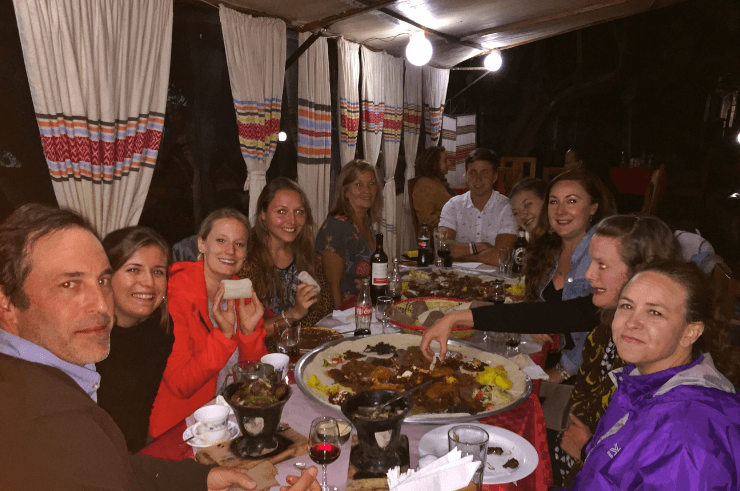
31. Eat Some of the Best Ethiopian Food Outside of Ethiopia
I feel like the Ethiopian food in Nairobi deserves its own point as it’s that good. Nairobi is known for having some of the best Ethiopian restaurants, outside of Ethiopia.
- Abyssinia: Abyssinia is one of my favourites – that’s where me and my group are in the picture above. They have two locations, one in Kilimani, and the other in Westlands (I prefer this one).
- Habesha: Another great Ethiopian restaurant I have visited many times. They also have restaurants in different parts of the city, one in Kilimani and one in Gigiri.
32. Experience the Awesome Nairobi Nightlife
Nairobi is a lively city and Kenyans like to party, so there’s always somewhere to have a drink and a dance, so if you’re looking for cool things to do in Nairobi at night, look no further.
- Brew Bistro Westlands: Famous for their craft beers (but they do lots of other drinks too), there are two locations around the city, one in Westlands and one on Ngong Road. Check out their website here. Happy Hour 5pm – 7pm, occasional live music.
- The Alchemist: The Alchemist is a popular bar and beautiful, cool event space with food trucks, live music, open-air cinema, dj’s, shops and ping pong. Try the Mama Rocks burgers, they’re awesome! They also have the Made in Kenya shop here which sells all kinds of locally made good, such as jewellery, clothes, shoes and food.
- K1 Clubhouse: Cool restaurant/bar in the Westlands/Parklands area. They also have a flea market on Sundays and regular events.
- Bao Box: Boardgame bar/restaurant in Westlands.
- Choices Pub: Popular local spot, good for well-priced drinks and dancing.
- Gipsy: Popular bar and club in Westlands, always busy on the weekend.
- The Oval – Artcaffe: Part of the Artcaffe cafe chain, but this one is also a night venue with salsa night on a Friday night. Popular with the after-work crowd during the week, and busy both Friday and Saturday night. In Westlands.
- Nest at Tribe: Rooftop bar at the Tribe Hotel with Moroccan decor and shisha. In Gigiri.
- Simba Saloon: In Langata, this is the nightclub at Carnivore. Not somewhere I’d go all the time (I’m a bit ‘over’ big clubs with offers on shots and neon lights) but it can be fun on occasions with the right crowd.
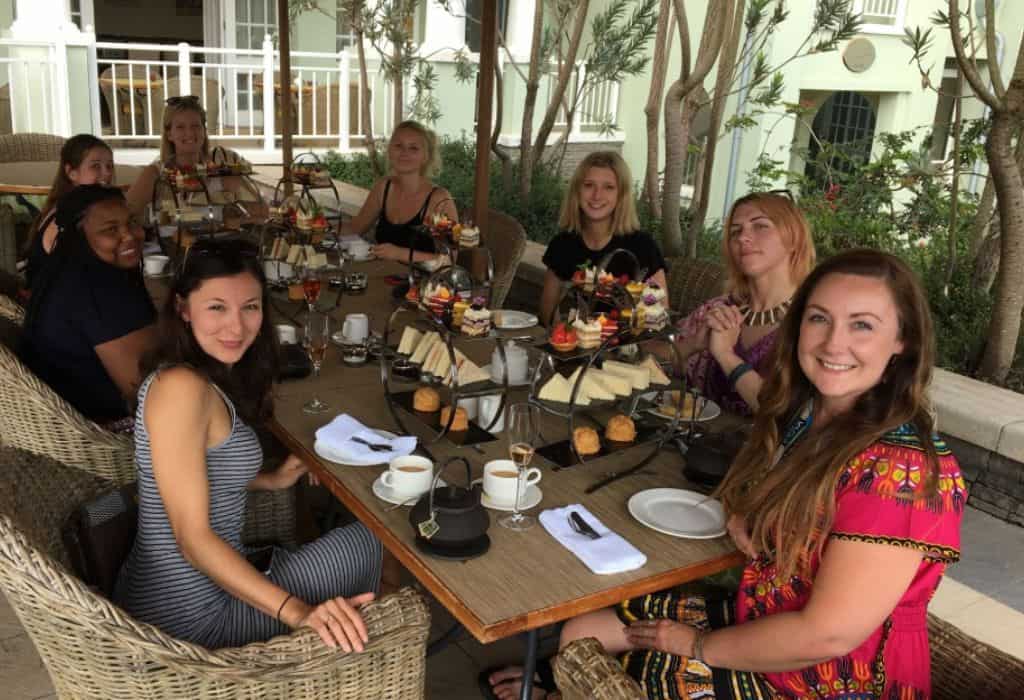
33. Go for High Tea
There are lots of things that the colonial British brought to Kenya and one of the better ones was high tea (or afternoon tea as we usually call it these days) which is usually served between 3pm – 5pm.
Many hotels in the city serve high tea, which usually consists of sandwiches, cakes, scones (with jam and cream) and of course tea. Usually, there’s an option to add a glass of something fizzy on the side.
The best places to find high tea in Nairobi are:
- K Lounge at Villa Rosa Kempinski
- Hemingways (where we are above)
- The Lord Erroll
- The Tea Room at Fairmont The Norfolk (be sure to visit the famous Lord The Lord Delamere Terrace)
- Giraffe Manor (but… you have to be a guest there, unfortunately)
I hope this helps you plan your trip to Nairobi! And let me know if you have any other recommendations I can add to the list!
Other Kenya posts you might enjoy…
- Planning a Safari in the Masai Mara – Everything You Need to Know
- A Guide to Samburu National Reserve in Kenya
- How to Visit the Umoja Women’s Village in Kenya
- A Little Guide to Lamu Island in Kenya
- Planning a Trip to Ol Pejeta Conservancy in Kenya – Everything You Need to Know
- A Magical Kenya Itinerary – Safaris, Cities & Beaches
- 10 Unique Places to Visit in Northern Kenya
- The Perfect 2-Week Kenya & Tanzania Itinerary
If you’d like to join the Rock My Kenya & Tanzania Adventure you can find out more here.
Pin This Post For Later

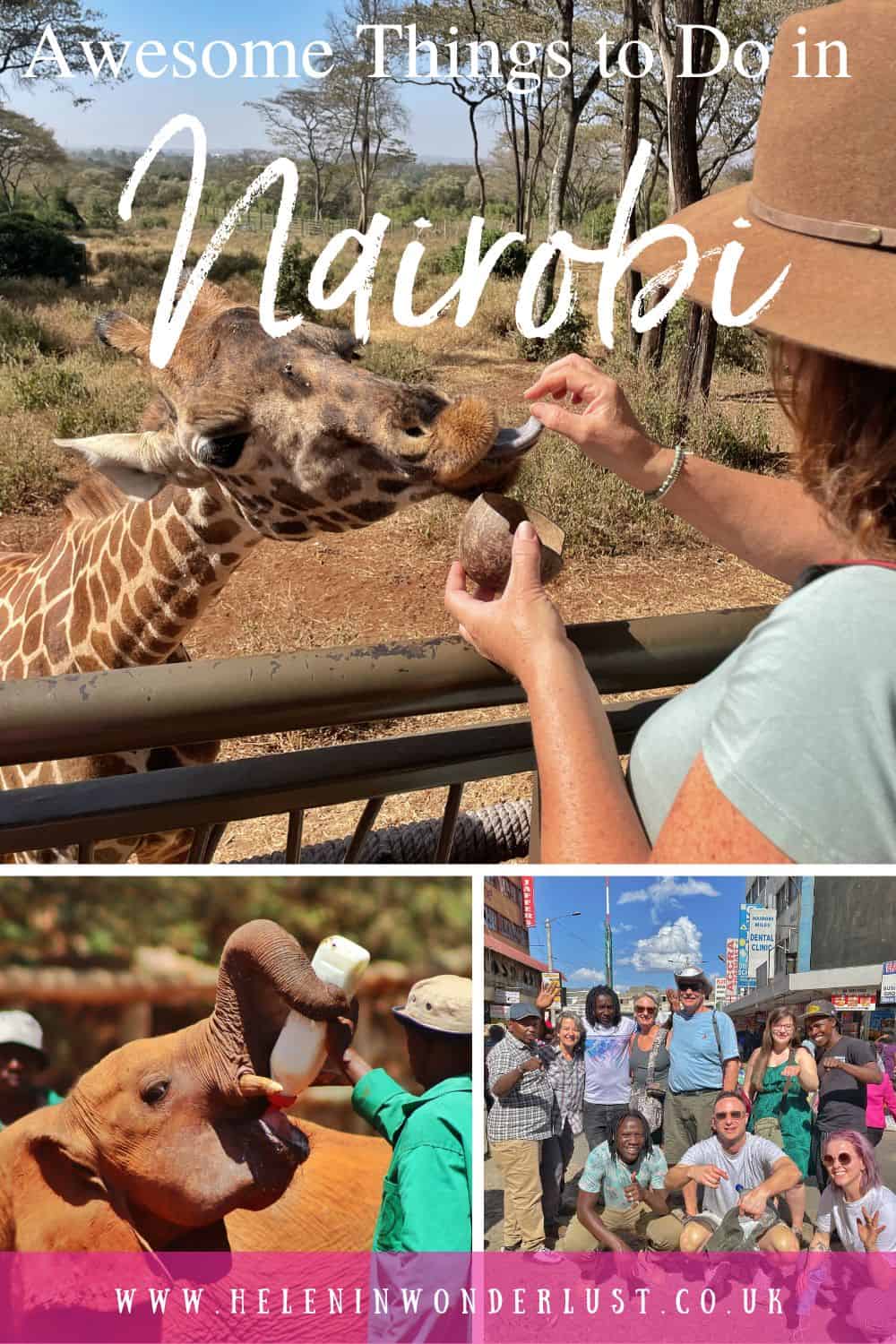

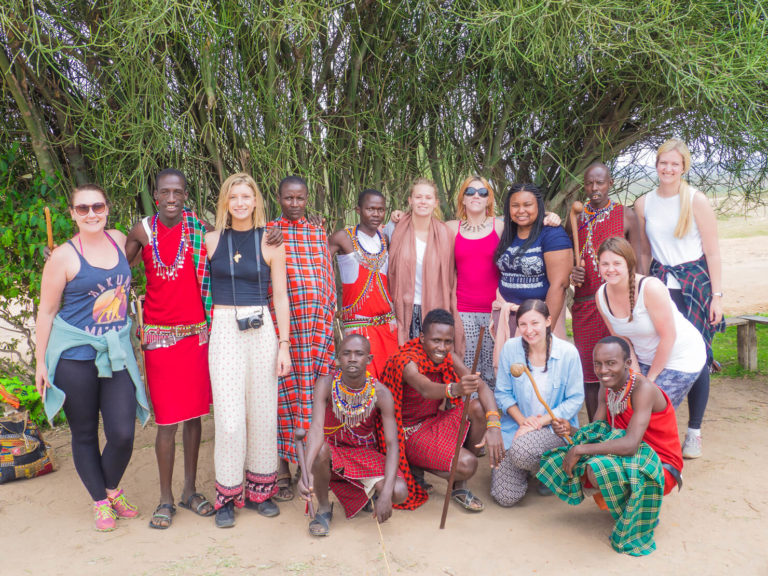
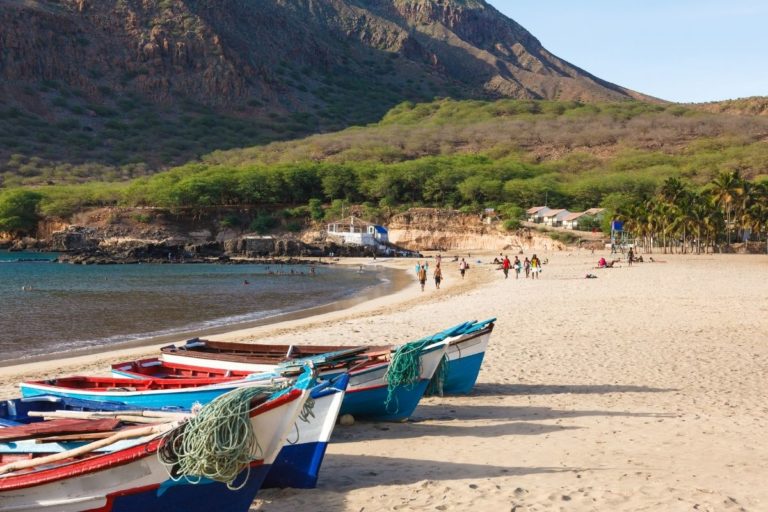
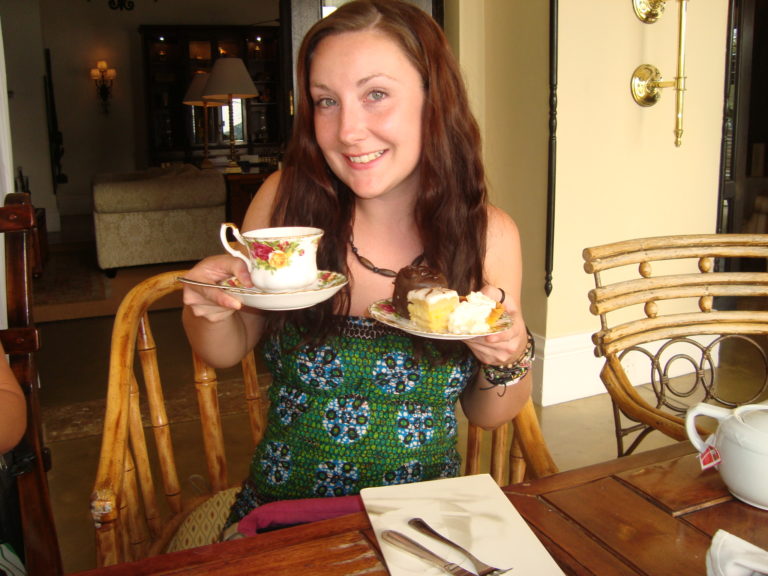
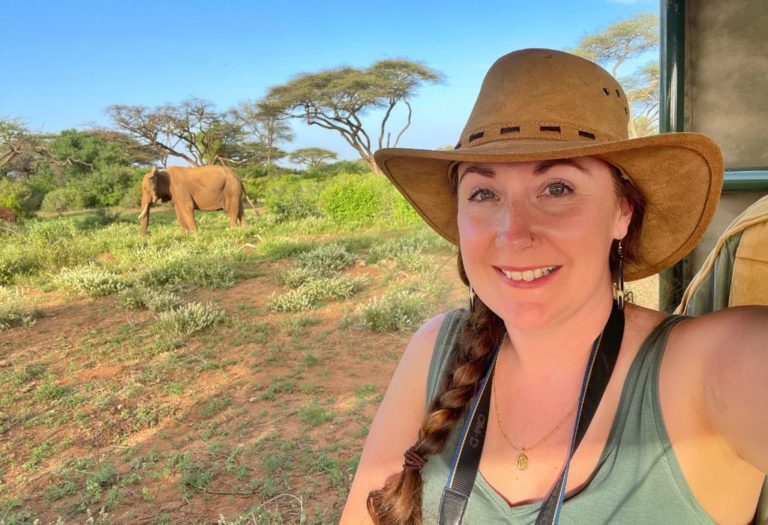
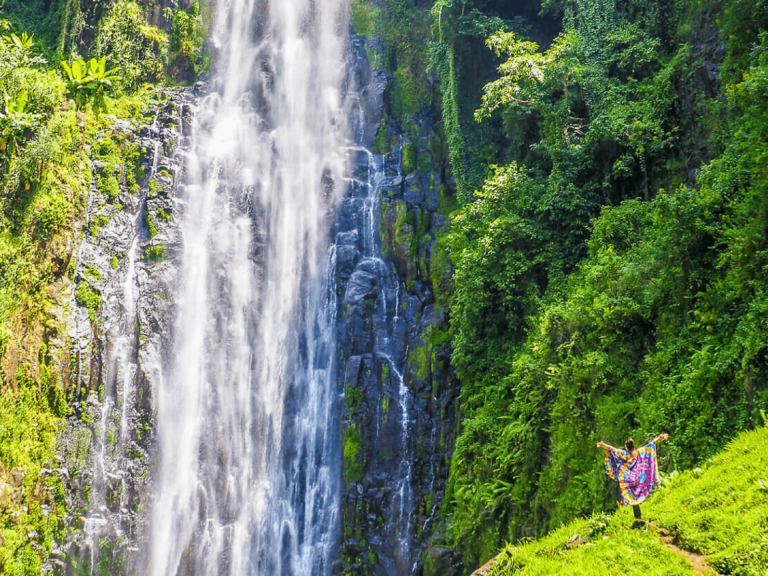
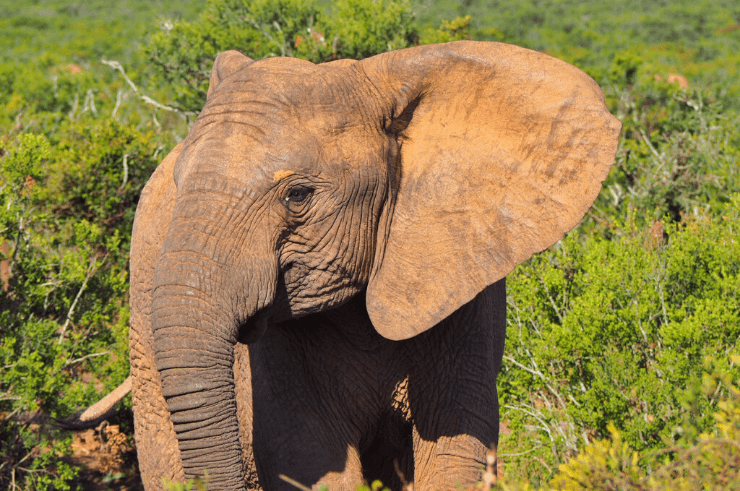
Wonderful information . I am a former resident of Kenya and am visiting Nairobi for family reasons. I will be here until end of January 2021. I want to do some city tours and one short adventure country tour. Am not sure what is available due to Covid restrictions. Please advise. Looking forward to hearing from you and hopefully do something worthwhile during this visit.
These all look amazing! I have a brother who visits Africa frequently and loves it. Thanks for this!
I can’t believe you’d put going to “areas tourists shouldn’t go” to hear people talk about how difficult their lives were/are. Povery porn much? People aren’t tourist attractions.
Hi there.
Thanks for your comment. Judgemental much? 🙂 But just to set the record straight…
Firstly, I totally agree – people are not tourist attractions. But this is not what this is… this is a walking tour of a city with some former street boys who, on their own terms, tell you their stories as you walk.
Actually, I say ‘places where tourists probably wouldn’t (or shouldn’t) go alone’ – not because it’s poor – it’s not a slum, it’s part of Nairobi city centre, but it’s a notoriously dangerous part of the city.
The boys tell you that themselves. Those are not my words. It’s not a place tourists should walk alone because street crime is very common in the area. If you go on the tour you will hear more about this. You walk with a guide per 1 or 2 people because this is the best way to ensure the group stays safe.
Have you been to Nairobi? I’m guessing not, because if you had, you’d understand the context. And if you read the post properly then you’ll see that I’m saying to go on a tour because these guys are inspiring.
You’re American right? And there are plenty of American cities that have dangerous parts that you might not go to unless you were with someone who was well known in the area. This is no different.
This is not ‘poverty porn’. We don’t go around taking pictures of ‘the poor people’ if that’s what you were assuming. We walk around a notoriously dangerous part of the city, whilst a group of former street boys tell their inspiring stories about how they turned their lives around.
In their words ‘This encounter is a unique opportunity to get inspired by people from a different world.’
This tour is very respectful and I believe that interacting with and becoming friends with people from different cultures and countries, is a very beautiful thing. It’s encounters like this that really open your mind.
These guys are amazing. They were street boys who now make a living telling their stories. How amazing is that?
I love what they are doing, so I support them. I’ve known these guys for a few years now and they are my friends. I love what they have built and love how they are helping other young boys to get off the streets.
If you’d like to read more about what they do, or perhaps take a tour and support their cause next time you’re in Nairobi, you can book here: https://nai-nami.com/
Once you’ve been to Nairobi and taken a tour with Nai Nami, then we can have this discussion. Until then… please get off your high horse, read what has actually been written, be kind, be less judgemental and please stop trolling people on the internet.
Have a lovely day. 🙂
Helen
Very well said, Helen. I am planning a trip to Nairobi and have found your site very informative and I am very interested in taking a tour with these boys. I think what they are doing is fantastic. I will be traveling with my husband and our 11 year old and I think this would be a fantastic experience for her.
In your opinion, would she be able to handle a Kibera Township tour? I would like her to understand how privileged we are to have all we have but I have no idea what these areas might be like. I would very much appreciate your thoughts.
Also, would we be better off doing a safari in SA or in Kenya (we will be traveling to both)?
Thank you so much.
magda
Hi Magda,
Thank you for reading and commenting!
I’ve not done a Kibera township tour, I’m sure she could handle it, but I’ve not personally been, but have been to other similar places, like Soweto in South Africa. Like I say in the post, I think it’s a personal decision and obviously you just need to be respectful, which I’m sure you would be. 🙂
Taking a tour with Nai Nami is a great thing to do and the boys will look after you.
In terms of safari, both Kenya and South Africa are great. I love the Maasai Mara. Where in South Africa are you going? Kruger is good, but I personally prefer the Mara. But generally you can’t go wrong with a safari in either country – maybe do both if you can! 🙂
Hi Helen. I’m definitely not a troll, I’m a real person who doesn’t quite agree with you top suggestion of “things to do in Nairobi”. I can certainly appreciate that you’ve built a relationship with the men from Nai Nami, and I think that’s really valuable. Of course having local guides in an area you’re traveling in can really help you understand an area you’ve perhaps never been to before. That being said, as I’ve been researching for an upcoming trip to Kenya, I’ve been quite off-put and frustrated by the number of websites that suggest outings very similar to Nai Nami (I do however recognize the subtleties of it being a tour of downtown with locals, which I’ll come back to in a moment).
The issue in my mind is really the way that most people respond to such an experience. Perhaps you are not one of such people, perhaps you are. But the majority of people that I know, bloggers, and instagrammers who went to almost any African country, came back talking about “how lucky they feel, how blessed they are, how much their eyes were opened” etc etc etc. And that is the consistent narrative about Africa. Poverty. Violence. Lack of development. And those things are there. But Africa is also a continent of rich culture and development and experiences far outside of the Western World–and that should be the narrative.
I recognize that you know these guys and this experience and you’re of course helping them out by suggesting that people do this outing, which I totally get. But I think it walks a very thin line that many, if not most people, are not equipped to handle correctly.
Take Magda for example (no offense Magda you seem very sweet and supportive and I’m glad you’re taking your 11 year old to Kenya)–she’s suggesting that visiting one of Africa’s largest slums might be a good way to show her daughter “how privileged we are”. And your only suggestion was to “just be respectful” which doesn’t do much to help your case on understanding the subtleties of the situation. I don’t think it’s possible to choose to GO ON A TOUR of an incredibly impoverished community in order to impress upon a child the wealth discrepancy between themselves and a child growing up in Kibera and have that be respectful in any way shape or form. *This* is the reason I take issue with this tour being the first suggestion of things to do in Nairobi.
Hi Apallled,
Thanks for your response.
My initial issue with your comment was that you made a snap judgement and left a rude, nasty, ill-informed comment on my website about something you didn’t know anything about.
People seem to forget that there are other humans on the other side of the computer which is why it comes across as trolling/being a keyboard warrior.
Your comment was not a constructive one, it didn’t ask for clarification, didn’t give any thoughtful insight, it had no understanding of Nairobi city or the tour I was referring to (confusing it for a slum tour) and it was just plain obnoxious.
Having a different opinion is fine. Leaving nasty comments on the internet is not cool. Your second comment, however, is written in a much more thoughtful way, I really appreciate that.
What’s a bit frustrating, is that you are now bringing Magda’s subsequent question regarding slum tourism (and my response) and your annoyance of the way Africa is portrayed in general by the media into the mix as an argument/excuse to validate the rudeness of your first comment.
You say:
“I don’t think it’s possible to choose to GO ON A TOUR of an incredibly impoverished community in order to impress upon a child the wealth discrepancy between themselves and a child growing up in Kibera and have that be respectful in any way shape or form. *This* is the reason I take issue with this tour being the first suggestion of things to do in Nairobi.”
As I have explained, the Nai Nami tour is NOT a slum tour, it’s NOT poverty porn. Nai Nami tours take place in the city centre, NOT Kibera. Magda’s question about taking her daughter on a Kibera tour is separate from her question about Nai Nami tours. I am NOT advocating a slum tour as the ‘top’ thing on my list (although I do believe there is a place for township tours which I’ll get to below). I’m advocating a different type of inner-city walking tour run by a group of inspiring young men who are doing great things in their local area. The focus of the tour is totally on them and their stories. So the *This* you are talking about above doesn’t make sense.
Whilst I appreciate that you may have been off-put and frustrated by the number of bloggers/Instagrammers that suggest that Africa is ‘poor, impoverished, violent’ and it seems that you are aiming that part of the second comment at whoever is reading (not just at me), let me tell you that you are preaching to the converted here.
If you read my website/look at my Instagram, it’s quite obvious that at no point do I paint Africa in a predominantly negative light, or perpetuate the ‘poor Africa’ narrative. To be honest, I think that’s quite an outdated view and I think a lot of bloggers/Instagrammers are doing a lot to show the positive sides of Africa.
I’ve been travelling/working in Africa for the last 12 years and am an advocate of the fact that Africa is not the poor, impoverished, dangerous place that it is made out to be on the media. My whole life’s purpose is to show people how bloody great Africa is, through my blog, through the tours I run and through the book I have just written.
I very much agree with you that “Africa is also a continent of rich culture and development and experiences far outside of the Western World – and that should be the narrative.”
Please read my blog – that IS the narrative! Again, this comes back to why I take strong objection to your first comment, the lack of research and the way it was expressed.
So let’s move on to the slum tours…
As I mentioned, in my opinion, going on a slum tour is a personal decision. At the end of the day, the slums are there. You can either ignore them and pretend they’re not there, or you can acknowledge them. Maybe you visit. Maybe you don’t.
The governments of a lot of countries barely acknowledge their existence. The residents get little support. They support themselves as a community. Slum/township tourism is one way of doing that.
But what’s the alternative? Have you been to a slum/township? Have you seen the alternative ways to make money? Well, I have… and tourism really is not the worst one.
In an ideal world, slums wouldn’t exist. But they do. And if local people want to make money with tourism, then it’s not anyone else’s place to say otherwise.
Most township/village tours that I have been on paint the areas in a predominantly positive light. They tell it like it is, the good, the bad and everything in between – it’s all there. In fact, people are very proud of where they come from. It is a glimpse into a different way of life and it brings money into local communities – by providing wages for the residents, bringing in tourism that supports local businesses (food stalls, jewellery makers etc).
To your point – “I don’t think it’s possible to choose to GO ON A TOUR of an incredibly impoverished community in order to impress upon a child the wealth discrepancy between themselves and a child growing up in Kibera and have that be respectful in any way shape or form.”
Magda wants to visit. She wants to take her daughter and she has her reasons. Those reasons being that she wants her child to understand her privilege. It’s not my place to judge or say whether she should or she shouldn’t. Neither is it yours.
That may be the reason she chooses to go on the tour. But it undoubtedly won’t be what she comes away with and THAT is the important part. What she’s likely to come away with is humanity, compassion, a sense of community, an impression of proud and hardworking people who crack on despite any challenges they might be facing. An understanding that we are all human-being together, it’s not ‘us’ and ‘them’. It’s just us. A human race.
With a mum who wants to show her daughter the world as it is, in all forms, she will, no doubt, grow up to be a well-rounded, empathetic human being.
I stand by my point that township tours can be beneficial to all involved when done in a respectful way. And by that, I mean: not shoving cameras in people’s faces, not mocking the residents or looking down on them, listening to the local guides, going in with an open mind and non-judgemental attitude, and perhaps coming away with a different idea of what life in a township is actually like.
I didn’t expand on my ‘you just need to be respectful’ comment because I assumed that Magda would understand what I meant by that, but if not I guess it’s written above.
People don’t visit, the local people don’t earn money from the tour. The alternative, people visit, they gain insight into another culture, local people make money.
I also think it’s a bit funny of you to accuse me of not understanding the ‘subtleties of the situation’ when it appears to me that you haven’t stepped foot on the African continent, have never been to a township, never worked in a township, never taken a township tour and perhaps never met/spoken to a person who lives in a township. You have to experience Africa to even try to begin to understand the complexities of it.
To me, it’s not about voyeurism, it’s about gaining an understanding of another culture/place from first-hand experience.
Your comments have given me the basis of a great blog post though. So thanks!
Helen
I apologize for the harshness of my original comment. 99% of the time, you aren’t going to change someone’s mind, stance, or discourse surrounding such a topic on the internet, even if you write the world’s most eloquent, empathetic, and well-researched comment. Nor was I anticipating any response on an older post on a clearly well-run blog. And as you’ve said yourself, that’s probably due to operating on two sides of a computer screen. My intentionI can respect that you’ve spent a significant amount of time on the African continent and help show people other sides of the countries therein.
I have not been to a township or on a tour, nor do I ever plan to (nor do I need to flout the places I HAVE been to in order to validate my points). I don’t believe it’s necessary to do something you categorically disagree with in order to know you don’t agree with doing it. Silly example but it would be like saying to someone “Well you’ve never embezzled money so you can’t say it’s wrong.” I do not think it’s right to tour a township, so I would not choose to do so.
However, I think the end of your comment gets to the heart of the matter. You’re clearly someone who has seen many of the sides of many African countries, and are looking at this from an empathetic, people-oriented point of view that says “well, township tourism is a way residents can make money, and it’s one of the better ways to do so” and I can 100% see where you’re coming from. I’m looking at the issue from a more objective standpoint and I personally do not think it is ethical. But I definitely see where your point of view comes from, so I’m grateful you’ve taken the time to talk about this. And you’re welcome for the blog content XD
Thanks for the apology. And thank you for taking on board my comments. Totally understand where you are coming from too. Township tours are a very complex subject and I agree that it’s a fine line that needs treading carefully. And very much respect your decision not to partake in them.
Good luck with your trip to Kenya, I hope you enjoy it and would love to hear about your experience. Nairobi is a great city. If you do end up taking a Nai Nami tour, would love to get your take on it.
Helen
Hey Hellen,
Your blog has been really helpful. I’m planning a Nairobi trip. Thank you for the very detailed and informative articles.
However, I think the Kibera Tour you mentioned was misunderstood. The way you spoke about it clearly didn’t depict poverty porn in anyway. Nonetheless, the lady who wanted to show her 11y/o “how privileged they are” should find a better way to do so rather than making her think Africa is poor.
Thanks